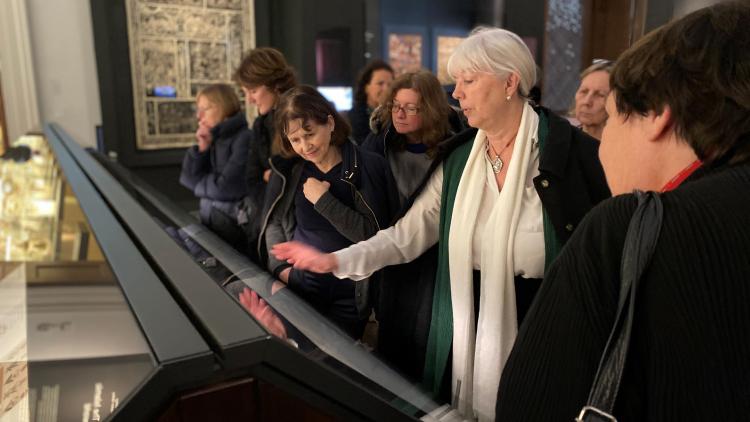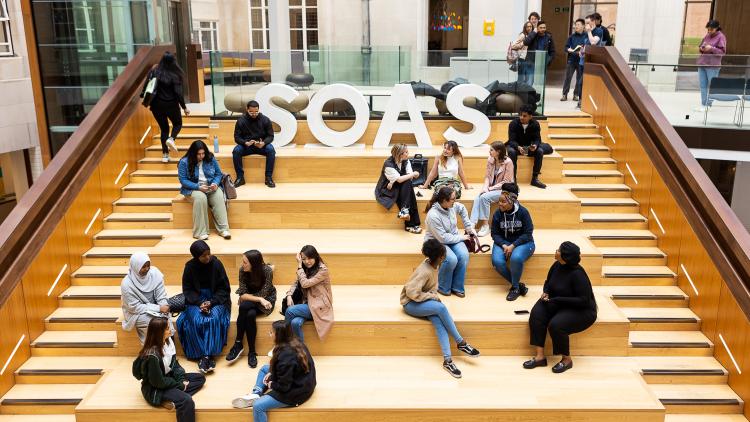Arabic (Modern Standard) Upper-Intermediate Course


Key information
- Duration
- 1 term per sub-level; 10 weeks per term
- Attendance mode
- Part-time, online/blended learning
Course overview
Course aim
This Upper Intermediate course is for students who have completed the full Intermediate course at SOAS or an equivalent number of hours of formal Arabic language study (approximately 240 hours). (If neither of these apply to you but you think this may be your level, an online assessment can be conducted, please book an assessment.
Learners will be able to deploy a wide range of grammatical patterns as well as to use fairly sophisticated vocabulary and expressions. It also develops students’ ability to process the Arabic writing system accurately and fluently so that they can read and write a range of texts on different topics with ease. This course is delivered by the Language Centre.
Method
The course is taught in Arabic with very little use of English and includes a further increase in exposure to Arabic grammar and vocabulary. It also further develops the skills of comprehension in listening and reading, and the skills of expression in speaking and writing.
This will be achieved through 20 hours of blended learning: 15 hours of online structured lessons with the teacher and supplemented by a minimum of 5 hours of guided independent learning which is supported by complementary material. The course objective will be achieved within the 10-week course.
Material
Our course materials page shows you what you need to buy for this course.
Entry requirements and progression route
This course is aimed at students who have completed the full Intermediate Course (Arabic MSA Intermediate 1, 2, and 3) or equivalent (approximately 240 hours of formal study). After completing Upper Intermediate 1, students progress onto Upper Intermediate 2, and then Upper Intermediate 3. After this, students can begin the Pre-Advanced level.
Please note, that each term, courses are subject to quorum requirements.
For course dates and information, please see our timetables.
Structure
Arabic (Modern Standard) Upper Intermediate 1
In this course you will:
- discuss the differences between colloquial and formal features of Arabic
- look into the emergence of Arabic sciences
- learn about Arab marriage traditions
- further your exposure to authentic Arabic media
- learn about Arab political systems and elections
- understand the use of the accusative
- learn to construct absolute negation
- further your knowledge of irregular Arabic verbs
- understand and use auxiliary verbs to explain the progress of events
- learn about Berber people and their culture
Arabic (Modern Standard) Upper Intermediate 2
In this course you will:
- converse about the relation between religion and politics
- discuss the impact of sects on allying and division
- raise issues and suggest solutions
- improve your translating skills
- learn about famous writers and thinkers
- look into different uses of demonstrative pronouns
- learn how to conjugate hollow verbs with jussive case
- use hollow verbs correctly with passive form
- explore how ما is used differently depending on context
- write a short essay summarising writers articles
- analyse different opinions and express your thoughts
- read longer texts, extract and discuss main ideas
- gain better understanding of Arab world issues
Arabic (Modern Standard) Upper Intermediate 3
In this course you will:
- learn about Egyptian theatre
- use synonyms and antonyms precisely
- derive adjectives and Masdar according to patterns
- discuss the difference between Arabic and western theatre
- learn about famous writers and thinkers
- talk about destiny and fate and related subjects
- learn about historical funny figures and their anecdotes
- conjugate weak verb الناقص correctly
- explore all uses of ما and use them appropriately
- write essays analysing statements and providing reasons
- analyse writer’s opinions and express your thoughts
- read longer texts, extract and discuss main ideas
- translate longer texts accurately
The above is an indication of content that may be covered over the duration of the course but it could vary depending on the level and progress of students in the class.
Contact us
Disclaimer
Important notice regarding changes to programmes and modules.
Related information
See the full list of Language Centre short courses in Arabic on the Arabic language homepage.
Image credit: Mario Cruz via Unsplash









